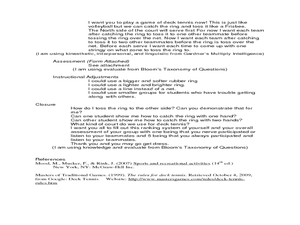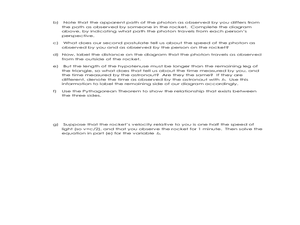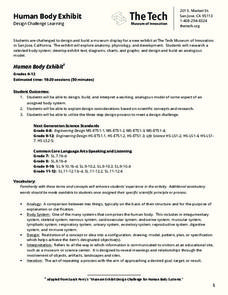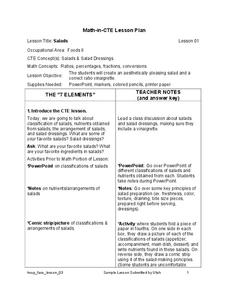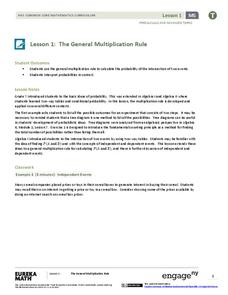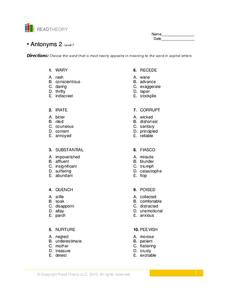Curated OER
Deck Tennis
Seventh graders study deck tennis. In this lesson that can be adapted to teach movement, passing and positioning in any sport, 7th graders toss and catch a rubber ring, students of varying abuilities will be able to participate in this...
Curated OER
Time Dilation and Geometry
Students solve problems of dilation and velocity. In this geometry lesson, students apply the Pythagorean Theorem to solve problems and relate it to time and velocity.
Curated OER
Unit 2 ~ Atomic Structure
As an atomic structure reference and review tool, this handout fits the bill. The first page provides definitions and tables of orbitals, electrons, and energy levels. The second page is an opportunity to practice determining numbers of...
NOAA
Ocean Layers II
Now that you know the ocean has layers, let's name them. The seventh installment of a 23-part NOAA Enrichment in Marine sciences and Oceanography (NEMO) program covers terminology associated with ocean layers, such as thermocline and...
Serendip
How Do Biological Organisms Use Energy?
When an organism eats, how does food become energy? Young biologists follow glucose through the process of cellular respiration to the creation of ADP using a discussion-based activity. The resource also highlights conservation of mass...
Serendip
Using Models to Understand Cellular Respiration
Energize biologists with colorful images in an activity that captivates the imagination while demystifying the subject of cellular respiration. Participants build comprehension skills and access core content knowledge by analyzing text...
American Statistical Association
Step into Statastics
Class members study the size of classmates' feet and perform a statistical analysis of their data. They solve for central tendencies, quartiles, and spread for the entire group as well as subgroups. They then write a conclusion based on...
American Statistical Association
Exploring Geometric Probabilities with Buffon’s Coin Problem
Scholars create and perform experiments attempting to answer Buffon's Coin problem. They discover the relationships between geometry and probability, empirical and theoretical probabilities, and area of a circle and square.
Tech Museum of Innovation
Human Body Exhibit
Explore human anatomy and physiology using models. Scholars study systems of the human body and design a display for a museum exhibit. To complete the activity, individuals create analogous models of their chosen human body systems.
National Research Center for Career and Technical Education
Salads
Lettuce talk for a moment about your culinary scholars; do they have what it takes to create a great salad? Show them the finer points of salad preparation with a career and technology lesson that combines direct instruction, creativity,...
Curated OER
Heterogeneous Equilibrium: Measurement of a Partition Coefficient
In this chemistry worksheet, students examine a concept in science and then use the knowledge in application by conducting an experiment.
EngageNY
The General Multiplication Rule
In the first installment of a 21-part module, scholars build on previous understandings of probability to develop the multiplication rule for independent and dependent events. They use the rule to solve contextual problems.
Curated OER
Kwanzaa Activities
Learners listen to a book about Kwanzaa and discuss the holiday and its importance. In this Kwanzaa lesson, students make crafts after they read and discuss the story.
Insted
Bullying Around Racism, Religion and Culture
Racism, antisemitism, Islamophobia. How to counter prejudice-driven bullying in schools is the focus of a packet of materials that provides information and advice on how to respond to and prevent bullying, materials for in-service and...
Curated OER
Gender Stereotypes and Body Image
Students discuss and become aware of the dangers of gender stereotyping and the media's role in perpetuating gender stereotypes. They view magazine advertisements and make entries in their journals after guided discussion.
Curated OER
Understanding the Water Cycle
Investigate the water cycle and how water moves from the land to the air and back to the land. Create a terrarium and observe the water cycle at work. Define weather terms including evaporation, condensation, and precipitation.
Curated OER
Concept Formation Lesson Plan: Understanding "Protest"
After analyzing both examples and non-examples of a variety of protests conducted by ethnic groups in Seattle and the state of Washington during the twentieth century, your class members will work to identify the key ideas and components...
Curated OER
Government Protecting Rights
Students explore tribal sovereignty. In this American Indian lesson plan, students learn about tribal sovereignty, watch a movie, take notes, and complete a reaction paper.
Curated OER
Antonyms 2
Learing antonyms for different words really deepens one's understanding of the vocabulary at hand. Use this resource to assess your learners knowledge of words like wary, recede, peevish, and nurture.
NOAA
Waves
Is it possible to outrun a tsunami? After watching a presentation that explains how waves and tsunamis occur, class members investigate the speed of tsunamis triggered by an earthquake.
Sargent Art
Metal Embossing Weathervanes
Metal work has been used for hundreds of years. Ninth graders get a chance to experience the artistry of metal embossing in this highly structured lesson. Each step is accented with a helpful image and related instruction. The end...
Illustrative Mathematics
Reasoning about Multiplication
In critiquing someone else's theory, learners share insight into their own understanding of mathematical concepts. Fifth graders will explore the notion that products are always larger than their factors. While this statement is true the...
Dick Blick Art Materials
“Rhythm in Layers”
Young artists learn to build rhythm into a design by repeating colors, shapes, and patterns in a 3-D sculpture activity.
NOAA
Plate Tectonics II
Mid-ocean ridges, rift valleys, island arcs, mountain ranges, earthquakes, volcanoes ... there are so many features associated with plate tectonics. The 14th installment of a 23-part NOAA Enrichment in Marine sciences and Oceanography...


